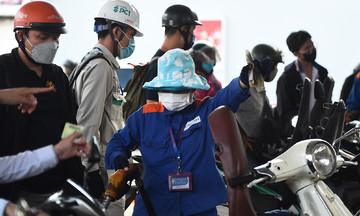Resolution 68 of the Politburo mandates the elimination of fixed taxes for household businesses by 2026. These businesses will transition to self-assessment and pay taxes based on actual revenue.
In its feedback on the draft Law on Tax Administration, VASS proposed a five-year, three-phase transition plan to the Ministry of Finance.
The first phase (the initial two years) focuses on legal and technical preparation, including accounting software. VASS recommends providing free software, equipment (tablets and internet access), and training (bookkeeping and tax filing) for small businesses, especially in remote areas.
The second phase (the next two years) mandates self-assessment for businesses with a certain revenue threshold, accompanied by incentives like a 20-30% tax reduction in the first year and support for accounting fees.
Technically, VASS suggests upgrading local tax management systems, integrating declaration, payment, and filing platforms, and continuing digital financial literacy training.
The third phase (the final year of the five-year plan) completes the nationwide transition. Household businesses will be integrated into the national tax system like small enterprises, with support for automated e-accounting tools and continued tax incentives upon transitioning to enterprise status.
VASS also recommends financial support for businesses in difficult areas during the transition, promoting social insurance, credit access, and labor training for formalized businesses.
 |
Dong Xuan Market. Photo: Hoang Giang |
Vietnam has over 5.2 million household businesses, generating 8-9 million jobs, comparable to the private sector. VASS considers eliminating fixed taxes necessary for modernizing public financial management, ensuring fairness, transparency, and promoting sustainable development in the private sector.
However, VASS is concerned about potential system overload with millions of businesses transitioning simultaneously in the initial phase (2025-2026).
Therefore, VASS recommends investing in technology and training technical support staff. Compliance costs are also a factor, requiring appropriate financial support policies.
Responding to VASS, the Ministry of Finance stated that Resolution 198 requires the elimination of fixed taxes from early 2026. The Law on Tax Administration will be amended accordingly, implementing self-assessment from that point.
The Ministry of Culture, Sports, and Tourism urged careful consideration of the roadmap to avoid disruption, especially in rural areas with limited technology access and subsistence economies.
They also recommended local flexibility mechanisms to avoid hindering business activities.
The Tax Department previously announced plans to classify household businesses into four revenue groups for management starting next year.
Group 1, below the tax threshold, is encouraged to use e-invoices and simple bookkeeping. Group 2, with annual revenue from 200 million to under 1 billion VND, is encouraged to use e-invoices from 2027-2028 with simple bookkeeping.
Group 3 (agriculture, industry, construction with 1-3 billion VND revenue, and trade, services with 1-10 billion VND) must use e-invoices and implement simplified accounting. Group 4 (over 10 billion VND) must use e-invoices and full accounting practices.
The Hanoi People's Committee proposed requiring businesses to register bank accounts and use electronic transactions for business activities, separating personal and business finances for transparency and tax assessment.
The Ministry of Finance will consider these suggestions, amending the draft Law on Tax Administration to create a suitable tax management model for household businesses, ensuring transparency and practical implementation.
Phuong Dung












